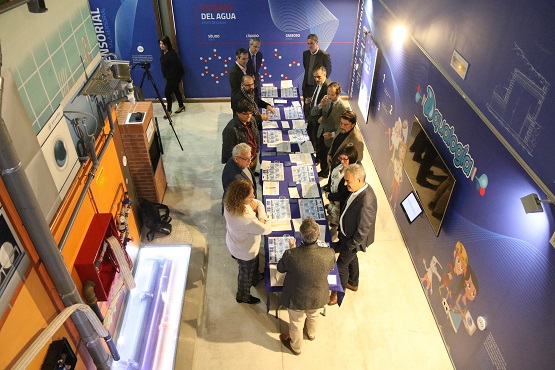Aguas de Alicante holds its last Board of Directors' meeting in 2018
Aguas de Alicante analysed and proposed immediate actions to prevent discharge in the area of Playa del Cocó. In addition, it was unanimously agreed to increase the coverage of its support scheme, which has funds of over €500,000 for vulnerable groups.

Actions
Investments in works include actions proposed to double the wastewater pumping station and the screen system. These actions are designed to prevent discharge in the area of Playa del Cocó, as the current pumping capacity will be doubled and a simultaneous connection will be possible with the wastewater treatment stations of Monte Orgergia and Rincón de León.
In addition, infrastructure will be strengthened to prevent discharge caused by electrical faults and an automatic bar screen will be installed to retain solids. However, the definitive solution to the problem involves constructing a new anti-CSO tank.
At the meeting, actions were highlighted that are being executed in the main wastewater pipe that removes wastewater from Rambuchar and Pepior at a cost of €1,671,663.
Within the Special Investment Plan, which has a budget of around €55 million for implementation up to 2020, works are being undertaken to improve the control of flows and pressure and increase the output in the networks of Pla de la Vallonga, Altozano, Gran Vía, Garbinet Este, Barrio Juan XXIII and Cabo Huertas. The budget for these actions is €729,169. In addition, the drinking water network is being renovated in the area of Les Palmeretes II, at a cost of €112,676.
In drinking water system renovation works, actions are being undertaken in Palmeretes II and in La Florida. In La Florida, works are also being undertaken in relation to sewer system replacement. In the coming months, actions will be undertaken in Plaza Manila, Calle San Juan Bosco, Fábrica de Sacos and Camino de las Parras. In addition, sewer system replacement works include actions in Calle San Roque.
Actions undertaken in Fernando Madroñal included renewal of sewer system infrastructure and an increase in hydraulic capacity, and improvements in the drinking water network and the urban appearance of Calle Boyero. Works began in October 2017, will take 22 months and have a budget of €3,316,223.
Social commitment
The Aguas de Alicante Board of Directors unanimously approved this morning an expansion of coverage of its support scheme, so that more people benefit than to date. Thus, the scheme, with a budget of over €500,000, will cover more concepts in the water bill, higher amounts in some cases, and can reach more vulnerable individuals and associations of owners and dwellings in the Municipal Housing Board.
Environmental commitment
Another point that was highlighted at the Board of Director's meeting was the considerable increase in reclaimed water. In the same period as in the previous year, 47.6% more reclaimed water was used for agricultural irrigation, and 23.2% more for irrigation of green areas and the washing down and cleaning of streets.
In addition, it was noted that the Jose Manuel Obrero anti-CSO tank has been at its highest level of rainwater storage since 2012, at 522,633 m3 up to November 2018. Rainwater is then diverted to the treatment plant and is not discharged directly into the environment.
Others
After the Board of Directors' meeting, a water tasting session was held. First, the proper procedure for tasting water was described. Then, participants tried several types of water from different sources. The study was carried out using sensory analysis, with testing by participants and an approach similar to that used in market research when a new product is launched.
The samples included bottled mineral water, water from wells, water from desalination plants and a combination from various sources. All the samples were numbered so that the tasting was blind: participants did not initially know which water they were tasting. Tap water was one of the samples that was rated highest by participants.
